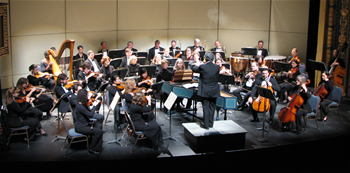Badi Assad, heard in concert at Duke as part of the Cantoras Brasileiras series, is unclassifiable. She is Brazilian, but scarcely known in Brazil, and the music of Brazil is hardly in evidence in her repertoire. She has a formidable guitar technique, but prefers to use it to accompany her singing. Her pop songs are accompanied with an idiom that recalls either jazz or classical music, yet she ventures into neither of these genres in any serious way.
Badi is the younger sister of Sergio and Odair Assad (a leading guitar duo, but specializing in classical music), and grew up in Rio de Janeiro, where her brothers were studying. (As she remarked during the concert, now they are becoming known as her brothers, rather than the other way around). Unlike most pop performers, who are vocalists first and guitarists second using the guitar simply as support for the vocal line, Badi is a superlatively talented guitarist, with a technique which makes it seem that even the most difficult feats are child’s play. Her singing is competent, with a wide range, secure intonation, and control, but the sound she produces is tightly focused, and rather than seducing with warmth and depth verged on the off-putting-whiny. At the same time Badi manages to produce a wide array of percussive effects with her voice — pops, clicks and such.
The show began with a string of her own compositions, culminating in an anthem to animals being wiped out by human influence, with innocent lyrics climaxing in a symphony of jungle sounds — monkey cries, bird song etc. She then moved to a section of covers — first a tune by Chico Buarque and Edu Lobo (barely recognizable even to one who knew the song), and then songs by the Eurhythmics (closer to the original) and U-2. The final portion of the concert brought quite a variety of music, including a blues arrangement of a pagode from the repertoire of Seu Jorge, as well as an extended solo on Jew’ s harp.
Badi had an easy manner with the audience, conversing in Portuguese with the Brazilians in the audience (asking whether Durham was treating them well), and in English the rest of the time. Her technique is simply jaw-dropping. Where she needs to grow as an artist is in understanding how to speak directly, simply, honestly, expressing emotion in a way that will move the listener, not simply astonish.
Though she is 41, her manner is still one of childish glee, of play-acting, with no depths of feeling, of suffering, of redemption, none of the combination of melancholy with hope which makes the best Brazilian music memorable and beautiful.












